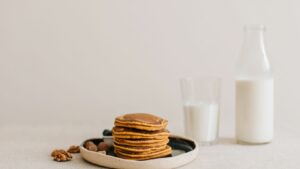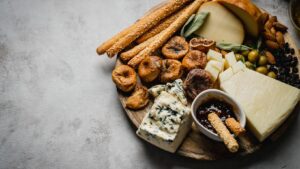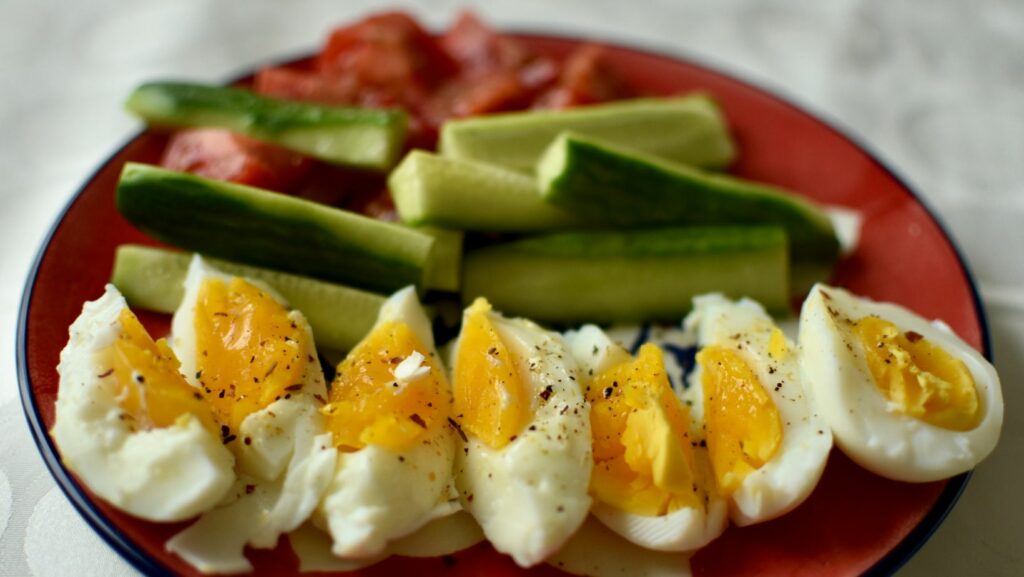 High Protein Non Dairy Snacks
High Protein Non Dairy Snacks
- Nutritional Value: High protein non-dairy snacks offer essential nutrients and support muscle growth and recovery, making them a great choice for health-conscious individuals.
- Variety of Options: There is a wide range of high protein non-dairy snacks available, including roasted chickpeas, nut butters, hummus, and protein bars, catering to diverse dietary preferences.
- Weight Management: These snacks promote satiety and can aid in weight management by reducing overall caloric intake without sacrificing energy levels.
- Quality Ingredients: Prioritize snacks made from whole, unprocessed ingredients, and focus on those with high protein, low added sugars, and sufficient fiber for optimal health benefits.
- Incorporation Tips: Plan ahead and keep high protein non-dairy snacks accessible to maintain energy levels, pair them with fruits or veggies for balanced nutrition, and experiment with homemade recipes for greater enjoyment.
- Mindful Eating: Practicing mindful eating can enhance satisfaction and prevent overeating, ensuring that you fully enjoy your snack choices while supporting overall health.
In a world where health-conscious choices are on the rise, high protein non-dairy snacks have become a go-to option for those seeking nutritious alternatives. Whether for a post-workout boost or a midday pick-me-up, these snacks offer a satisfying way to fuel the body without relying on traditional dairy sources.
With a variety of flavors and textures, non-dairy snacks can cater to diverse palates while providing essential protein. From crunchy chickpeas to creamy nut-based dips, the options are endless. This article explores some of the best high protein non-dairy snacks that not only taste great but also support a balanced lifestyle.
Overview of High Protein Non Dairy Snacks
High protein non-dairy snacks provide essential nutrients while offering diverse flavors and textures. These snacks appeal to a wide range of dietary preferences, including vegan and lactose-intolerant individuals.
A variety of options ensure that everyone finds a satisfying choice. Examples include:
- Roasted Chickpeas: Crunchy and flavorful, delivering up to 7 grams of protein per ounce.
- Nut Butters: Almond or peanut butter contains about 7-8 grams of protein per two-tablespoon serving, perfect for spreading on fruits or whole grain toast.

- Edamame: Young soybeans provide approximately 9 grams of protein per half-cup, offering a nutritious snack option.
- Hummus: Made from chickpeas, it typically contains around 8 grams of protein per cup, ideal when paired with sliced veggies or whole grain crackers.
- Chia Pudding: Chia seeds pack about 5 grams of protein per ounce, effectively used in pudding recipes.
- Protein Bars: Many brands offer vegan protein bars, often containing 10-20 grams of protein per serving, making them convenient for on-the-go.
These snacks not only satisfy hunger but also contribute to daily protein intake, promoting muscle recovery and overall health.
Benefits of High Protein Non Dairy Snacks
High protein non-dairy snacks offer numerous benefits, making them a smart choice for health-oriented individuals. These snacks not only satisfy hunger but also support dietary preferences and nutritional needs.
Nutritional Advantages
High protein non-dairy snacks provide essential nutrients, including vitamins, minerals, and healthy fats. Protein-rich snacks promote muscle growth and repair, aiding in recovery after physical activity. For example, edamame contains about 17 grams of protein per cup, while hummus offers approximately 8 grams per serving. These snacks also contribute to feelings of fullness, reducing the impulse to overeat. High fiber content found in many options, such as chickpeas and chia seeds, enhances digestive health. Incorporating these snacks into a daily diet ensures a well-rounded intake of macronutrients, which is crucial for overall health.
Weight Management
High protein non-dairy snacks play a significant role in weight management strategies. Protein increases satiety, leading to reduced caloric intake throughout the day. Consuming snacks like roasted chickpeas or nut butters helps maintain energy levels without excess calories. Studies show that high protein diets can aid weight loss by preserving lean muscle mass while promoting fat loss. Choosing non-dairy options aligns with various dietary restrictions, making them accessible for many. Implementing these snacks into meal plans supports sustainable weight management and healthy lifestyle choices.
Popular High Protein Non Dairy Snack Options
High protein non-dairy snacks offer diverse choices packed with nutrients. The following categories highlight some of the top options available.
Nuts and Seeds
Nuts and seeds serve as excellent high protein non-dairy snacks. Almonds, walnuts, and pumpkin seeds provide healthy fats alongside significant protein content. For example, a 1-ounce serving of almonds contains 6 grams of protein, while pumpkin seeds offer 7 grams. These snacks also deliver fiber, vitamins, and minerals, enhancing overall dietary health. Additionally, nut butters, such as almond or cashew butter, can be enjoyed with fruits or whole-grain crackers for added nourishment.
Protein Bars
Protein bars cater to those seeking on-the-go nutrition without dairy. Many brands feature plant-based protein sources like pea protein, brown rice protein, or hemp protein. A typical protein bar contains between 10 to 20 grams of protein, making them suitable post-workout options or midday energy boosters. Look for bars with minimal added sugars and whole ingredients to maximize health benefits. Popular vegan bars often include ingredients like nuts, seeds, dates, and dark chocolate for delicious flavor combinations.
Legume-Based Snacks
Legume-based snacks offer a powerhouse of protein and fiber. Options like roasted chickpeas and spiced lentil chips deliver about 5 to 8 grams of protein per serving. These snacks not only provide a satisfying crunch but also support digestive health thanks to their fiber content. Hummus, made from chickpeas, serves as a versatile dip for veggies or whole-grain pitas, contributing additional protein while enhancing nutrient intake.
How to Choose the Right High Protein Non Dairy Snacks
Choosing the right high protein non-dairy snacks involves careful consideration of nutritional content and ingredient quality. Some key factors to evaluate include reading labels and examining ingredient quality.
Reading Labels
Reading labels ensures understanding of nutrient profiles and serving sizes. Focus on:
- Protein Content: Opt for snacks with at least 7 grams of protein per serving for effective satiety.
- Added Sugars: Select snacks containing minimal added sugars, ideally less than 5 grams, to avoid unnecessary calories.
- Caloric Density: Assess the caloric content in relation to protein to maintain a balanced snack choice. Snacks should provide enough energy without overwhelming calorie counts.
- Fiber Level: Look for snacks high in fiber, as they complement protein by enhancing satiety, ideally with at least 3 grams of fiber per serving.
- Whole Ingredients: Choose snacks made from whole, unprocessed ingredients for maximum nutritional value. Examples include whole nuts, seeds, and legumes.
- Avoiding Fillers: Exclude snacks with artificial additives, preservatives, or excessive fillers. These components may compromise health benefits and flavor.
- Nutrient Density: Select snacks featuring nutrient-rich ingredients. For instance, snacks incorporating chia seeds or nuts offer omega-3 fatty acids and antioxidants alongside protein.
- Sourcing Practices: Investigate sourcing or manufacturing practices when possible. Ethical and sustainable sources often lead to higher ingredient quality.
Tips for Incorporating High Protein Non Dairy Snacks into Your Diet
Integrating high protein non-dairy snacks into daily routines enhances nutrition and satisfies cravings. Follow these strategies for successful incorporation:
- Plan Ahead: Schedule snack times throughout the day, choosing high protein non-dairy options to keep energy levels stable. Pre-pack snacks in portion-controlled containers for convenience in busy lifestyles.
- Pair with Fruits or Vegetables: Combine snacks like nut butters with apple slices or hummus with carrot sticks. This creates balanced combinations that boost flavor and nutrient diversity.
- Keep Options Accessible: Store high protein non-dairy snacks at home, work, or in the gym bag, making them easily reachable. This reduces the likelihood of opting for less healthy alternatives.

- Experiment with Recipes: Try making homemade snacks, such as protein-packed energy balls using oats, nut butter, and seeds. This encourages creativity and customization based on individual taste preferences.
- Use as Post-Workout Fuel: Choose high protein non-dairy snacks after workouts to support muscle recovery. Options like edamame, protein bars, or chia seed pudding provide the necessary protein for optimal recovery.
- Make Snacks a Meal: Transform smaller snacks into a complete meal by combining multiple options. Pair a protein bar with a smoothie or a serving of roasted chickpeas with a side of vegetable sticks.
- Explore Varieties: Sample different types of high protein non-dairy snacks to discover favorites. Options such as lentil chips, spiced nuts, and vegan cheese spread add variety and keep snacking enjoyable.
- Mindful Eating: Focus on enjoying each snack while eating. Practicing mindfulness can prevent overeating and enhance satisfaction with each portion.
Implementing these tips makes it easier to maintain a consistent intake of high protein non-dairy snacks, positively impacting overall health and energy.
Promoting Well-being
High protein non-dairy snacks offer a versatile and nutritious solution for those seeking to boost their protein intake without dairy. With a variety of flavors and textures available there’s something to satisfy every palate. These snacks not only provide essential nutrients but also support muscle recovery and weight management.
Incorporating these options into daily routines can enhance overall health and energy levels. By choosing high-quality ingredients and being mindful of nutritional content individuals can enjoy delicious snacks that align with their dietary preferences. Embracing high protein non-dairy snacks can lead to a more balanced lifestyle while satisfying cravings and promoting well-being.


